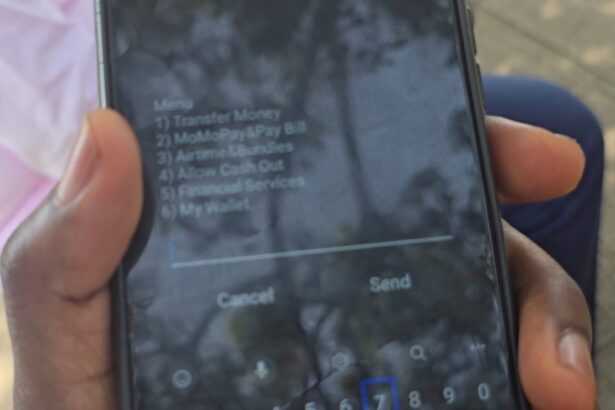It’s a struggle every time Foster Kudese. a visually impaired National Service person at the University of Ghana attempts to send money or buy airtime from his mobile money account.
The process, which should usually take less than a minute, takes Foster about five to ten minutes, sometimes more.
“It’s very difficult. Because we are using the talkback or voice-over on the phone, we have to wait to listen to whatever the phone is saying before choosing your option. After selecting your option, you sometimes have to memorize the number in your head before you can input the numbers.
“After that then you confirm the name…if you don’t get it right you have to cancel the whole process and restart again,” the 26-year-old who works with the Balme Library told TV3’s Laud Adu-Asare.

“It’s even worse when the network is unstable,” he adds.
Since its inception, Mobile Money (MoMo) has transformed financial transactions, bringing banking to the fingertips of millions of people.
Despite this glass-breaking move, visually impaired persons are yet to enjoy the full features of this transformative tool.

There are two options available for every user. The use of either the Unstructured Supplementary Service Data (USSD), sometimes referred to as “quick codes” or “feature codes” or the mobile application software of the telecom company in use.
Like Foster, 24-year-old Jeffery Ayum, also visually impaired, shared his frustration with the mobile money system.

He affirms that apart from the stress associated with using the USSD for his transactions, his telco’s app, offers a more agonizing experience.
The colourful features of the app do not provide any relief for someone who cannot see and the added layer of security further exacerbates their plights.
“The isn’t disability friendly. For us persons with visual impairment, it’s not friendly at all. At first, it was good but right now it’s unreliable. I even called them to complain about it. They told me they’ll get their technical team to work on it but I never heard anything,” he lamented.

This Telco’s is just one of the many available apps provided by the respective telecommunication companies in Ghana that do not include visually-impaired-friendly options in the composition of their apps.
Generally, all instant payment systems operating in Ghana are not visually impaired-friendly raising an issue of inclusivity.
Executive Director of the Ghana Blind Union, Dr Peter Obeng-Asamoah described his frustrations when he wants to send money using his banking app. He lamented that apart from the short period required to input the details to carry out the transaction, there is no access to input an existing contact from one’s phone to send the money to.

“When you’re sending money to a different number, ordinarily there’s a button that makes you add a person from your existing contact but that’s not available to us on the screen reader. You either memorise the number or end up getting someone to mention the number to you, losing the privacy of it all,” Dr Obeng-Asamoah posited.

He noted that the stress of it all has limited his usage of banking applications for transactions.
He called for a review for it to be more accessible to visually impaired persons to make its usage worthwhile.
Chief Executive of Ghana Chamber of Telecommunications, Ing. Dr Kenneth Ashigbey shares similar sentiments with the persons with disability. He posited that more should be done to rope visually impaired persons into the inclusivity.

“Most of these our digital technologies are English-based or text-based. Even if it’s not a text that you have to type your numbers… it means when the thing pops up you should be able to read it. So, if you’re virtually impaired, you’ll struggle with that.
“We need to make this a lot more inclusive. We need to ensure that the language that is used is the local language of the people. It should not be in English. It should be that, if you’re Ewe or Dagbani or Ga, you can do it in that language.
“We need to find a way of moving them unto the app so that they are not dialing a code but they can get something pictorial and something that can pick their biometrics. You are able to speak to the device and it speaks back to you. It’s able to identify your voice, your face and other biometrics and allows you to do the transaction,” he noted.
But how feasible is this? Director of Product at Ghana Natural Language Processing, Lawrence Adu-Gyamfi noted that incorporating local language features in mobile money applications is very viable.
According to him, his company which focuses on Natural Language Processing of Ghanaian Languages and its Applications to Local Problems is open to working with telecommunication companies in Ghana to incorporate local languages onto their apps.
Lawrence Adu-Gyamfi indicated that once prioritised by the telcos, it will be easy for local languages to be added to the features of the digital payment systems. The app currently has Twi, Ewe, Ga, Dagbani, Fante, Kusasi and others.
“All the services we do are available through an application programming interface so any telco could technically today for free of charge just get on board and test it and see. If it fits in their pipeline, because it’s limited through a paid package, we will be very happy to invest and support to make sure this product is available to everyone, especially the visually impaired,” Adu-Gyamfi added.
According to the 2024 State of Inclusive Instant Payment Systems report, Africanenda Foundation, a non-profit organization that aims to accelerate financial inclusion in Africa revealed that Ghana is the only country where domestic schemes are interoperable with one another, giving rise to higher subscription and user base.
There are however concerns about availability and accessibility to all persons across the country.
Deputy Chief Executive Officer of Africanenda, Sabine Mensah explains that despite Africa leading in instant payment systems in the world, more needs to be done about financial inclusion.

“We’re advocating for regulators to put in place an enabling environment for digital payment systems to be accessible to all, available to all because we still have 400 million adults excluded in Africa,” she noted in an interview with the media at the launch of the report.
Digital payment system is one of the pillars of Digital Public Infrastructure (DPI), that helps to facilitate digitalisation. Deepening DPI requires following the principles of accessibility, interoperability, inclusivity and innovation, security and privacy.
Source: Laud Adu- Asare (3news.com)





